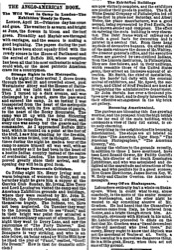Title: The Anglo-American Boom | The Wild West in Camp in London—The Exhibition Ready to Open
Periodical: Philadelphia Inquirer
Date: May 9, 1887
More metadata
THE ANGLO-AMERICAN BOOM.
The Wild West in Camp in London—The Exhibition 'Ready' to Open.
LONDON, April 26.--Primrose day has come and gone. The weather is as warm and bright as June, the flowers in bloom and the turf green. Piccadilly and Mayfair are thronged with carriages, and the season is making a good beginning. The papers during the past week have been about equally filled with the rowdy scenes in the House of Parliament and the arrival of Buffalo Bill, whose reception has been all that his most enthusiastic admirer could wish, or the most patriotic American crave for a countryman.
Strange Sights in the Metropolis.
On the night of their arrival I drove drown through the well lit and crowded street, past Westminster Abbey and the Houses of Parliament. All was light and bustle and noise. Then I turned up a dark avenue, and was challenged by a guard, gave the pass word and entered the camp. In an instant I was transported from the heart of the metropolis of the world, with its five millions of people, to the heart of the Rocky Mountains. The camp was lit up with the faint flickering light of the camp fires. It was 11 o'clock, and every one was asleep but the guards and the commander. As I approached Buffalo Bill's tent, which is located on a point at the foot of the bluff, I saw him standing by the fire side, with his arms folded, lost in thought. Several times during the night he made a tour of the camp to assure himself all was well, with as much anxiety as if he had been in the heart of a hostile Indian country instead of the centre of residential London. The horses have improved greatly since their arrival, and by opening day will be in good form.
Savage Democratic Criticism.
On Friday night Mr. Henry Irving sent a warm telegram of welcome to Cody, and on Saturday night he gave him a supper at the Garrick Club. Sunday, Mr. Irving, Miss Terry [1] and Lord Lymington [2] visited the camp and the American Exhibition grounds and buildings, where they were received by Mr. John R. Whitley, the Director-General, and enjoyed themselves hugely. The Indians, too, have not been neglected. On Tuesday they went to the Lyceum Theatre to see "Faust," and in their bright war paint they attracted a most extraordinary amount of attention. Last night they went to Drury Lane, and saw the pantomime of "The Forty Thieves." Red Shirt, the Sioux chief, whose resemblance to Bonaparte is very striking, and who is an able fellow, on being asked by Willie Wild how he liked the play of "Faust," replied, "Good! Big Dream!" How is that for dramatic criticism?
The Exhibition Buildings
are now virtually complete, and the exhibitors are placing their goods in position. The S.S. White Dental Company of Philadelphia led off as the first in place last Saturday, and Albert Weber, the piano manufacturer, was a good second, being represented by Fred Eustis, the well-known leader and composer. The effect on entering the main building is very charming. The light frame work of railway rails affords a good basis for decoration and is painted in a neutral tint. From these hang myriads of decorative banners. On either side of the main entrance the doors of Mr. Whitley, the director general's office, and the executive offices are guarded by two civilized Indians, from the Lincoln Institution, in Philadelphia. They are fine fellows, and in their uniforms, which resemble those of the United States army, they attract an immense amount of attention. Mr. Smith, the chief of installation, [3] has his hands full daily with the constant arrival of exhibitors, and Mr. Speed, [4] the secretary, and Chief of Staff Penfield [5] are hard at it organizing the administrative department.
Mr John Sartain [6] has over a thousand pictures now on hand, and is deeply interested in their effective arrangement in the big brick art gallery.
Becoming Americanized.
The gardens are blooming this fine growing weather, and the prospect from the high bridge at the far end of the main building, which commands a view of their full extent, is extremely charming.
Everything in the neighborhood is becoming Americanized. The shops are all labeled on the signs "The American Cigar Shop." "The American Photographers," "The American Grocery," etc.
Among the visitors to the grounds recently, in addition to those I have mentioned, have been Lord Ronald Gower, Sir Phillip Cunliffe Owen, [7] late director of the South Kensington Exhibitions, and who was astonished and delighted at the magnitude and attractions of the place, and who predicts for it a great success; Miss Grace Hawthorne, [8] James Barton Key, [9] W. W. Kelly [10] and Charles Overton, [11] the American managers.
Away Off on Shakespeare.
Labouchere [12] evidently isn't a whale on Shakespeare. When in doubt what to say, abuse somebody, is the motto of the senior member for Northampton, and the other night he wanted to say something abusive of Mr. Goschen. [13] He had heard that the Chancellor's ancestors came from Italy, he believed from Venice, and a bright though struck him. Accordingly, obviously with Shylock in his mind, Mr. Labouchere proceeded to dilate on the fact that Mr. Goschen was a "lineal descendant of the old merchant who lived there." But surely, Henry ought to know that Shylock was not the merchant of Venice at all. Verily, a little learning is a marvelous dangerous thing. So is a little goak, Henry, when thou art not sure of thy ground.
Note 1: Alice Ellen Terry (1847-1928), an English stage actress, was among the most famous leading ladies of the Victorian era. [back]
Note 2: Earl of Portsmouth, Isaac Newton Wallop was also known as Lord Lymington and Viscount Lymington. [back]
Note 3: Rufus M. Smith (b.1847), of Hartford, Connecticut, Vice Consul-General of the United States, was Chief of Installation for the American Exhibition. [back]
Note 4: Mr. Speed is unidentified. [back]
Note 5: Frederic C. Penfield (1855-1922), of Hartford, Connecticut, was Chief of General Staff for the American Exhibition. [back]
Note 6: John Sartain (1808-1897), Chief of Fine Arts Department, American Exhibition. [back]
Note 7: Sir Francis Philip Frederick Cunliffe-Owen (1828-1894), director of the Kensington Museum (London), was best known as an organizer of exhibitions during the 1880s. [back]
Note 8: Grace Hawthorne (1860-1922), an American actress. [back]
Note 9: James Barton Key, 1853-1910, American actor and theatrical manager. [back]
Note 10: W. W. Kelly, theatrical manager for Grace Hawthorne. [back]
Note 11: Charles Overton, an American actor, playwright, and theater manager. [back]
Note 12: Henry Du Pre Labouchere (1831-1912), an English politician, writer, publisher, and theatre owner. [back]
Note 13: George Goschen, 1st Viscount Goschen (1831-1907), a British statesman and businessman and Chancellor of the Duchy of Lancaster. [back]
Title: The Anglo-American Boom | The Wild West in Camp in London—The Exhibition Ready to Open
Periodical: Philadelphia Inquirer
Date: May 9, 1887
Topics: Buffalo Bill's Wild West in Britain
Keywords: Buffalo Bill's Wild West Company Lyceum Theatre (London, England) Westminster Abbey
People: Argyll, John Douglas Sutherland Campbell, Duke of, 1845-1914 Eustis, Fred J., 1851 or 1852-1912 Gower, Ronald Sutherland, Lord, 1845-1916 Irving, Henry, Sir, 1838-1905 Labouchere, Henry Du Pré, 1831-1912 Napoleon I, Emperor of the French, 1769-1821 Sartain, John, 1808-1897 Terry, Ellen, Dame, 1847-1928 Whitley, John Robinson, 1843-1922 Wilde, William Charles Kingsbury, 1852-1899
Places: London (England) Rocky Mountains
Sponsor: This project is supported in part by a grant from the National Endowment for the Humanities and the Geraldine W. & Robert J. Dellenback Foundation.
Editorial Statement | Conditions of Use
TEI encoded XML: View wfc.nsp00755.xml
Back to top
